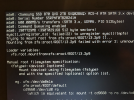The boot process fails to mount ZFS on root and drops to a mountroot> prompt.
The line before the ZFS error on screen says:
I have tried booting another boot environment, but there does not appear to be any others. There should be two previous good boot environments there, but they are not listed for some reason.
Before shutting down my laptop, I made a sysctl change to try to fix the awful sound volume on my laptop in FreeBSD. I followed advice in the following post https://forums.freebsd.org/threads/low-sound-volume.49620/
I entered the following command and the stored value of 45 was changed to 1.
It made the problem worse so I shut it down the laptop with 'poweroff' command to find out if that made a difference. Then I found this problem.
I am writing this post on the same laptop, booted into Windows 10 from the same SSD that shows no faults. Sound is OK too in Windows. I need some help to mount ZFS without destroying it. What do I do?
I have found these posts...

 forums.freebsd.org
forums.freebsd.org

 forums.freebsd.org
forums.freebsd.org
Do I need to make a FreeBSD memstick, to boot without installing and try to mount ZFS from that? How do I clear the tmpfs problem from my SSD?
The line before the ZFS error on screen says:
Code:
sysctl_unregister_oid: failed(22) to unregister sysctl(tmpfs)I have tried booting another boot environment, but there does not appear to be any others. There should be two previous good boot environments there, but they are not listed for some reason.
Before shutting down my laptop, I made a sysctl change to try to fix the awful sound volume on my laptop in FreeBSD. I followed advice in the following post https://forums.freebsd.org/threads/low-sound-volume.49620/
I entered the following command and the stored value of 45 was changed to 1.
Code:
sysctl hw.snd.vpc_0db=1I am writing this post on the same laptop, booted into Windows 10 from the same SSD that shows no faults. Sound is OK too in Windows. I need some help to mount ZFS without destroying it. What do I do?
I have found these posts...

ZFS - ZFS failed with error 22: Invalid fstype.
Hi all, Yesterday morning when starting my laptop I encountered the following message: Trying to mount root from zfs:zroot/ROOT/default []... Mounting from zfs:zroot/ROOT/default failed with error 22: retrying for 3 more seconds Mounting from zfs:zroot/ROOT/default failed with error 22...

Solved - Black screen when exiting DE
Hi, System: 13.2-release-p2 DE: xfce Graphics driver: nvidia-driver 535.86.05 startx works fine, but when log out from DE to console, I got completely black screen, no keyboard cursor, no mouse pointer. The NumLock light can be turned on and off though. Switching between consoles doesn't make...
Do I need to make a FreeBSD memstick, to boot without installing and try to mount ZFS from that? How do I clear the tmpfs problem from my SSD?
Last edited:


